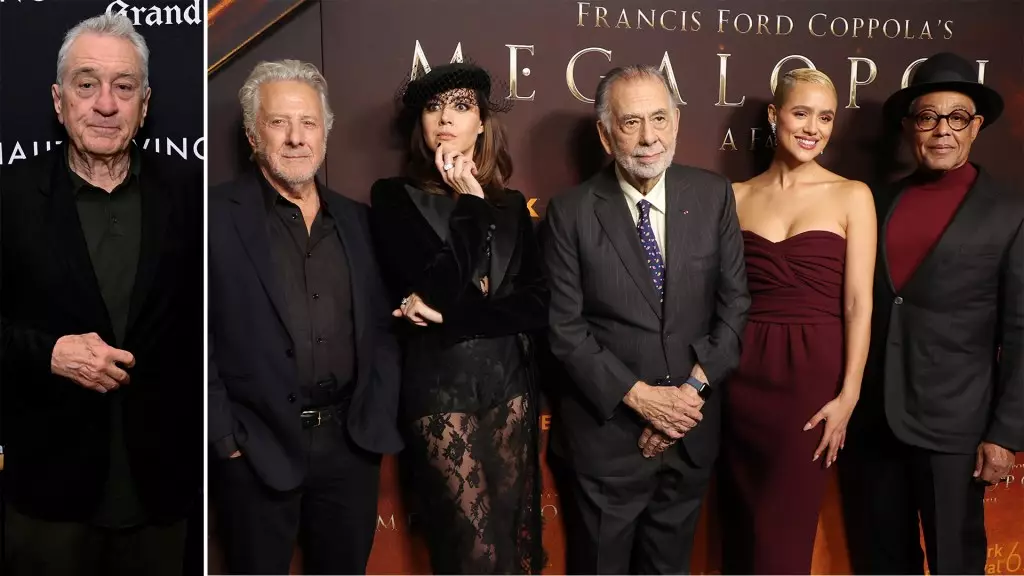The recent New York premiere of Francis Ford Coppola’s opus, *Megalopolis*, offered an enticing glimpse into the minds of some of Hollywood’s biggest names, including Robert De Niro, Spike Lee, and the director himself. Their collective presence at the AMC Lincoln Square IMAX served as a poignant reminder of the influential role cinema plays in reflecting societal sentiments—especially in politically charged times. The event’s energy was palpable, amplified by laughter and serious discussions that transcended the realm of entertainment. De Niro’s comments, indicative of both humor and gravity, encapsulated this striking balance.
De Niro’s bold hypothetical concerning Donald Trump directing a film generated uproarious laughter from the audience. The actor’s deadpan delivery only added to the weight of his words: “Imagine Donald Trump directing this film… It’ll never go anywhere, from total craziness.” His critique extended beyond humor; it was a deliberate commentary on a perceived lack of coherence and purpose in contemporary leadership. Positioning Trump as emblematic of chaos contrasted sharply against the structure and vision that a film like *Megalopolis* represents. De Niro’s message was clear: effective leadership requires not only a vision but also the capability to execute that vision—a concept he asserted Trump fundamentally lacks.
During the screening, as the veterans recounted their personal histories in the film industry, the conversation inevitably veered toward pressing political issues. De Niro expressed a sense of unease regarding the future of the country, paralleling themes in Coppola’s film with today’s political landscape. His insistence on the urgency of voting echoed a broader sentiment among those in attendance: the current political climate demands action. The actor’s vehement call to arms against what he viewed as a threat from a faction of the Republican party was not merely an expression of fear but rather a motivating plea for engagement among audiences.
Spike Lee resonated with De Niro’s sentiments, reinforcing the idea that every vote counts, particularly considering the upcoming election’s uncertain nature. He invoked the adage “forward, not backward,” and emphasized the necessity of proactive participation in democracy. Such statements, coming from figures with such rich histories in the film industry, highlight the increasing convergence of political activism and cinematic storytelling, revealing how intertwined these spheres have become.
Coppola’s remarks offered a nuanced perspective on the dynamics of ideological differences within creative endeavors. In his statement about having cast actors who politically diverge from his own beliefs, he illustrated the importance of humanity prevailing over blind allegiance and division. His hope that constructive dialogue can occur amidst disagreement stood in contrast to the polarized political climate. This long-standing tradition of artistic collaboration among divergent viewpoints underscores cinema’s potential as a medium for bridging divides and fostering understanding.
This collective sharing of experiences and the storytelling process transcends mere film-making; it becomes an act of resistance against the tendency toward polarization that currently grips society. In *Megalopolis*, these themes of collaboration and ideological conflict are reflected, making it not just a cinematic endeavor but also a cultural artifact steeped in relevance.
The road to bringing *Megalopolis* to fruition has been fraught with challenges, illustrating Coppola’s commitment to his vision. Given its $120 million budget—financed through Coppola’s own resources—the film embodies the director’s determination to explore themes of civilization, power, and societal decline as depicted through his unique cinematic lens. The film’s long gestation period highlights the complexities of modern filmmaking, particularly for ambitious projects that dare to tackle complex themes amidst a marketplace dominated by commercial viability.
The inclusion of a star-studded cast, featuring the likes of Adam Driver and Shia LaBeouf, alongside the recent mixed critical responses at Cannes, points toward an ambitious sweep that aims to challenge mainstream conventions. Critics’ views, while varied, reflect the essential discussions taking place within the film community—discussions that mirror the nation’s anxieties.
Ultimately, the premiere of *Megalopolis* serves as a multifaceted platform for reflections on the intersecting worlds of politics and cinema. Both De Niro’s stark criticisms and Coppola’s hope for collaboration remind us of film’s enduring power to encapsulate pressing social issues, provoke discourse, and inspire collective action. As artists continue to use their platforms to address the uncertainties of our time, inviting audiences to consider their roles in shaping the future, the resonance of these themes within *Megalopolis* stands poised to spark dialogues that extend far beyond the silver screen. In a world clamoring for perspective and progress, it is clear that the responsibilities of artists and audiences alike remain greater than ever before.



Leave a Reply